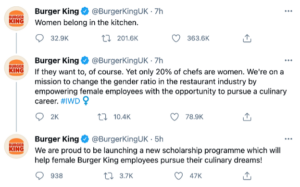We’ve all seen a tweet or two in our lifetime that has made us cringe. One that you read and think: “oh man, who approved this idea?” To say that was my reaction when I saw Burger King UK’s tweet on International Women’s Day would be an understatement.

It is easy to read the first tweet and ask yourself: “why on earth would a brand tap into a saying with a deeply misogynistic sentiment on International Women’s Day, a day that was meant to bring awareness to the sexism and misogyny that exist in this world?” *facepalm*
Burger King has since apologized, but only after the burger goliath was flame broiled again and again for its approach. Did Burger King want to give a wink and a nod to the “old boys clubs” around the world to boost sales? No, probably not. Did they want to try a tried—or tired, if you ask me—and true “shock and awe” approach to garner awareness, reach, and buzz beyond what a normal organic social media post would? Yes, more likely. Did they want to reclaim the joke on behalf of women? Swing and a miss.
In my opinion, they aren’t missing the mark here solely because they decided to post a saying with deeply misogynistic undertones. They are missing the mark because on a day that is about bringing awareness to inequality based on gender, they buried their own lede.
While the tweet in question has been removed, the extensive engagement it was getting—retweets, likes, and comments in the six figures—will have the kind of reach that marketers dream of. However, unless you clicked on the first tweet, you miss the other parts of the thread that have the punch line of the entire approach. Therefore, people were talking much less about the real reason Burger King joined the International Women’s Day conversation.
The second and third tweets in the series revealed that Burger King is fighting inequality within the restaurant industry with a scholarship program meant to bring more women chefs into the profession. A noble and necessary endeavor. However, by leading that news with “women belong in the kitchen,” they’re essentially undermining their intent to do well on behalf of women. Scholarships are utterly critical to elevating students to bring their talents to fruition. Will the program have the cloud of this joke around it moving forward? I personally hope not on behalf of the students whose lives could be changed by Burger King’s initiative.
What if this is the right joke, wrong execution?
Let’s take one second and imagine this approach with a different execution. The interpretation of the tweet was left up to the reader, and that falls on the reader’s association with what the saying already means. What if the message was presented by a woman in an image or video? It could’ve been the chance to stand for women who want to stand in the kitchen in pursuit of their dreams. What if Burger King reclaimed the joke on behalf of women by highlighting women?
I get why Burger King did what they did. The reach of that tweet organically, in addition to the #hottakes about it, gave it invaluable coverage. I mean, even I felt strongly enough about this that it is my first published post for Taoti.
Maybe we can all agree that we’re leaving the “sexist jokes to make a big buzz” strategy in 2020, but in the meantime, here are some brands that celebrated International Women’s Day with a slightly different, more appropriate approach.
